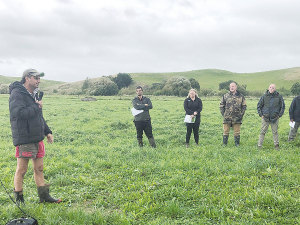DairyNZ Calls for Changes to Government’s Proposed Resource Management Act Reform
DairyNZ says the Government’s proposed Resource Management Act reform needs further work to ensure it delivers on its intent.
 Woodville farmer Ben Allomes (left) shares his Tararua Plantain project experience at the field day. Photo supplied.
Woodville farmer Ben Allomes (left) shares his Tararua Plantain project experience at the field day. Photo supplied.
Woodville dairy farmer Ben Allomes says the adoption of plantain has been a game changer for his farm system and business.
The former DairyNZ board member is one of several farmers in his district to take part in a fiveyear study into plantain use, overseen by DairyNZ.
He says the study, launched at a time when farmers were facing the introduction of thenunknown environmental regulations, was initially aimed at showing how plantain could help in nitrate management in maintaining farmers’ consent to farm.
“That benefit in itself is good enough to put up for plantain but what we actually proved is it provides serious feed quality and quantity at various times of the year,” he said.
Allomes milks about 600 cows on 290ha – a 200ha milking platform with the rest as support. He has previously milked up to 850 but has become more self-contained over the last three years. He says the farm is a mixture of flat land, good rolling milking country and steeper country. That gives him multiple options in how to use plantain.
He told Dairy News that one of the most successful methods was to follow a crop of fodder beet or turnips with either plantain or a plantain and clover mix. In that trial, the plantain and clover mix grew up to 19t/ha, about 50% more than a control paddock of ryegrass.
But he said the “amazing thing” was that the ryegrass paddock needed 130kg of nitrogen over the two years but the plantain and clover mix had no nitrogen, except for some capital fertiliser on establishment.
“So it grew 50% more with basically no nitrogen.”
Allomes also grows fodder beet for breakfeeding the milkers in autumn – rather than using it for wintering, because he says his soils “aren’t good for that”.
“So in a three-year period we grew 25 tonne of fodder beet then we put in an annual ryegrass to mop up the extra nutrient. That grew another 7 tonne.
“Then, we had two years of plantain and clover at 19 tonne, which means we grew about 70 tonne in three years versus 36 if it was just in ryegrass.”
Allomes recently hosted an open day on his farm where the results of the study were presented.
He now intends to take part in the follow-up study.
“The next step we now have to work out is what are the GHG emissions implications, what are the nitrogen leaching implications of the clover with the plantain and what will that actually look like in a five-year cycle.
“The main plantain project is finished. Now they want us to pick up some of the [lessons] and carry it on.”
DairyNZ’s Tararua Plantain project manager Adam Duker said the open day on Allomes’ farm was a special occasion, marking five years since the project began. It was also where the project was first discussed with local farmers.
“The project has been hugely successful, with 88 of the catchment’s 263 dairy farms planting plantain on their properties. Water quality monitoring by Tararua farmers has increased the local understanding of where to focus their environmental efforts,” he said.
DairyNZ presented project data showing plantain is an effective tool to help farmers meet their productivity goals, while achieving environmental success.
Farmers at the open day discussed their options for integrating plantain into pasture as well as potential barriers to adoption, primarily weed control options, and achieving longer term persistence of plantain in the pasture sward.
The Tararua Plantain Project was led by DairyNZ, with partners Agricom, MPI, Fonterra and Nestlé, with delivery partners including AgResearch, Horizons and Massey University.
Duker said the project ends this year but the partnership approach continues with the national DairyNZ-led Sustainable Food and Fibre Futures Plantain and Potency Practice (PPP) programme underway.
Budou are being picked now in Bridge Pā, the most intense and exciting time of the year for the Greencollar team – and the harvest of the finest eating grapes is weeks earlier than expected.
The Real Estate Institute of New Zealand (REINZ) has released its latest rural property report, providing a detailed view of New Zealand’s rural real estate market for the 12 months ending December 2025.
Rural retailer Farmlands has released it's latest round of half-year results, labeling it as evidence that its five-year strategy is delivering on financial performance and better value for members.
OPINION: "We are back to where we were a year ago," according to a leading banking analyst in the UK, referring to US president Donald Trump's latest imposition of a global 10% tariff on all exports into the US.
DairyNZ says the Government’s proposed Resource Management Act reform needs further work to ensure it delivers on its intent.
Overseas Trade Minister Todd McClay says he's working constructively with the Labour Party in the hope they will endorse the free trade agreement (FTA) with India when the agreement comes before Parliament for ratification.
OPINION: Expect the Indian free trade deal to feature strongly in the election campaign.
OPINION: One of the world's largest ice cream makers, Nestlé, is going cold on the viability of making the dessert.